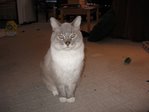 This may be something you are not aware of.....but you should be. Twin Cities students are national leaders in activism against military recruitment. That's right! And we should not only be proud of their efforts--but we should also help them in any way we can.
This may be something you are not aware of.....but you should be. Twin Cities students are national leaders in activism against military recruitment. That's right! And we should not only be proud of their efforts--but we should also help them in any way we can.Youth Against War and Racism (YAWR) was formed in 2004 and focuses on counter-recruitment, especially in high schools. Last November, YAWR (led by high-school students) successfully organized a student walkout and march in the Twin Cities that ended in front of the military recruiter's offices at the UM. The demonstration attracted over 2000 participants. Did our newspapers cover this event or were they worried about hurting the feelings of the troops?
Isn't it time we made a concerted effort to keep these vultures away from our high schools? This might be a first-step in the dismantlement of the imperialist, military machine in this country. Let's shut off their recruits--let's starve them of their cannon fodder.

The excellent website, Not In Our Name, spells out the clear lies being advanced by the military-industrial imperialist and reveals their insidious tactics:
"If you turn on MTV or BET you'll see the Go Army ads with the claim that if you join the military, you'll be able to travel the world, get nice uniforms, new friends, money for college, and a real purpose in life."
In addition, the funds being spent by the Pentagon are staggering--over $2.5 billion on recruitment. And to make matters worse, most of these recruits (and future front-line soldiers) are poor, minority kids.
In addition, Bush's No Child Let Behind law not only mandates that recruiters be allowed into high schools; but it also states that any school receiving federal funds is expected to turn over confidential information about its students to military recruiters.
Fortunately, there are many groups now being mobilized (good links at the end of this article) to contest the recruiters. But it's difficult to battle the money and power of the Pentagon. One of the strategies being utilized is to get counter-recruitment groups into the schools. If we can't keep the military out--we can at least get our side (the peace side) in!
 One more critical political consideration: the military-industrial complex understands what an advantage it has recruiting poor kids with few economic opportunities. Those of us on the left need to keep this in mind. We must continue to work for better schools and more job opportunities for those who would be inclined to accept the Pentagon's imperialistic blood-money. We have to provide a reason to for these kids to "just say no" to the military recruiters.
One more critical political consideration: the military-industrial complex understands what an advantage it has recruiting poor kids with few economic opportunities. Those of us on the left need to keep this in mind. We must continue to work for better schools and more job opportunities for those who would be inclined to accept the Pentagon's imperialistic blood-money. We have to provide a reason to for these kids to "just say no" to the military recruiters.








